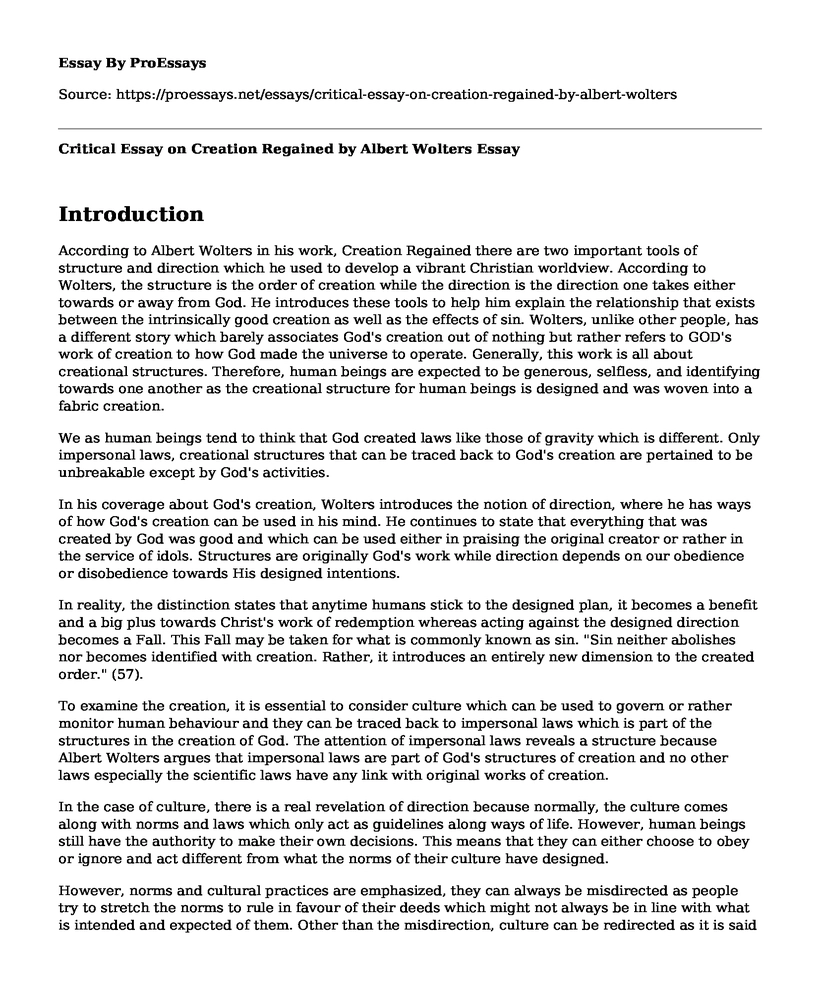Introduction
According to Albert Wolters in his work, Creation Regained there are two important tools of structure and direction which he used to develop a vibrant Christian worldview. According to Wolters, the structure is the order of creation while the direction is the direction one takes either towards or away from God. He introduces these tools to help him explain the relationship that exists between the intrinsically good creation as well as the effects of sin. Wolters, unlike other people, has a different story which barely associates God's creation out of nothing but rather refers to GOD's work of creation to how God made the universe to operate. Generally, this work is all about creational structures. Therefore, human beings are expected to be generous, selfless, and identifying towards one another as the creational structure for human beings is designed and was woven into a fabric creation.
We as human beings tend to think that God created laws like those of gravity which is different. Only impersonal laws, creational structures that can be traced back to God's creation are pertained to be unbreakable except by God's activities.
In his coverage about God's creation, Wolters introduces the notion of direction, where he has ways of how God's creation can be used in his mind. He continues to state that everything that was created by God was good and which can be used either in praising the original creator or rather in the service of idols. Structures are originally God's work while direction depends on our obedience or disobedience towards His designed intentions.
In reality, the distinction states that anytime humans stick to the designed plan, it becomes a benefit and a big plus towards Christ's work of redemption whereas acting against the designed direction becomes a Fall. This Fall may be taken for what is commonly known as sin. "Sin neither abolishes nor becomes identified with creation. Rather, it introduces an entirely new dimension to the created order." (57).
To examine the creation, it is essential to consider culture which can be used to govern or rather monitor human behaviour and they can be traced back to impersonal laws which is part of the structures in the creation of God. The attention of impersonal laws reveals a structure because Albert Wolters argues that impersonal laws are part of God's structures of creation and no other laws especially the scientific laws have any link with original works of creation.
In the case of culture, there is a real revelation of direction because normally, the culture comes along with norms and laws which only act as guidelines along ways of life. However, human beings still have the authority to make their own decisions. This means that they can either choose to obey or ignore and act different from what the norms of their culture have designed.
However, norms and cultural practices are emphasized, they can always be misdirected as people try to stretch the norms to rule in favour of their deeds which might not always be in line with what is intended and expected of them. Other than the misdirection, culture can be redirected as it is said to be real and ideal which means there is room to become what the people ought to be. Culture can also be learned, unlearnt and relearnt which makes it less rigid for adaptations. In conclusion, Wolter's tools are really helpful as they help one to understand their capacities in doing what they wish to and that they have room for improvements.
Works Cited
Bradley, Richard. "Time Regained: The Creation of Continuity." Journal of the British Archaeological Association, vol. 140, no. 1, 1987, pp. 1-17.
Wolters, Albert M. Creation Regained: Biblical Basics for a Reformational Worldview. Grand Rapids, Mich: W.B. Eerdmans Pub. Co, 1985. Print.
Wolterstorff, Nicholas. Art in Action: Toward a Christian Aesthetic. Grand Rapids, Michigan: William B. Eerdmans Publishing Company, 1996. Print.
Cite this page
Critical Essay on Creation Regained by Albert Wolters . (2022, Aug 15). Retrieved from https://proessays.net/essays/critical-essay-on-creation-regained-by-albert-wolters
If you are the original author of this essay and no longer wish to have it published on the ProEssays website, please click below to request its removal:
- Is Islam a Peaceful Religion? - Paper Example
- Ten Things About Prophet Muhammad - Essay Sample
- The Book of Joshua Themes Paper Example
- Essay Example on 9/11: Flaws in Pre-Attack Response and Aftermath
- Essay Example on God Grants Humanity Dominion Over Nature
- Brief Summary of Hinduism Essay Example
- Spirituality Reflective Paper Example







